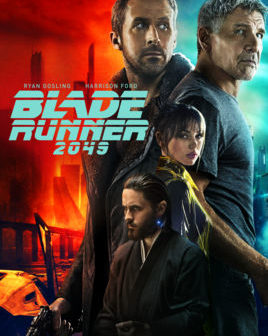Blade Runner, now a modern classic, provides insights regarding unrestrained capitalism, industrial technologies and most importantly, what it means to be human. If anything, it has grown in status over the years.
Blade Runner, released in 1982, was based upon the brilliant 1968 Philip K. Dick 1968 novel, Do Androids Dream of Electric Sheep. Although sharing common themes, the movie is substantially different, and in my opinion, even better than the compelling Dick novel.
The movie is built around the concept of replicants, which are androids virtually indistinguishable from humans. Their makers, the Tyrell Corporation, live by the motto more human than humans. Yet, the replicants are basically slave laborers, forced to do the jobs humans do not want.
The replicants are stronger, more agile and possibly more intelligent than humans. The first replicants were manufactured without memories, so they were much less sophisticated than humans. Later models, however, were given false childhood memories, so their emotions developed along human lines. As the replicants acquired experience and additional memories, they developed a sense of self. This led to a desire for freedom, and from time to time, groups of replicants revolted and killed their human slave masters. Because humanity worried about a large scale revolt, the replicants were manufactured with only a four year lifespan. In addition, they were used for difficult or dangerous tasks off world, and banned from coming to earth. Any replicants on earth were hunted by specialized police officers called blade runners, tracked down and retired.
Eco-disaster is the other main theme. In the novel, the ecosystem has been destroyed by war, but in the movie, unrestrained capitalism and the resultant pollution seems to be the culprit. Virtually all the animals and plants on Earth have died out, replaced by synthetics. Owning a live animal is only for the rich; most people purchase synthetic animals. Los Angeles is pictured as dark and constantly raining, a victim of unrestrained human industries.
In the movie, world weary blade runner Rick Deckard is pulled out of retirement to hunt a group of four rogue replicants. The replicants seek to escape from their four year death sentences, and their leader Roy Batty confronts Dr. Eldon Tyrell, the creator of the replicants. However, Tyrell claims that he can not lengthen their lifespan, and Batty, his hopes crushed, murders Tyrell.
Replicants may be uncovered by the Voight-Kampff machine, which is similar to a lie detector. Deckard tests the machine on Rachael, an advanced type of replicant, who is so human-like, she almost evades detection. In fact, Rachael does not know she is not human, she has been loaded with memories of her childhood, and she is crushed when Deckard reveals the truth. Deckard, in turn, feels empathy for her, a strange emotion for a man who retires replicants. He begins to realize humans and replicants have much in common; the replicants are not mere machines.
One by one, the replicants are retired, until only Batty remains of the original four. Deckard tracks him down, but in a thrilling confrontation, Batty turns the tables and has Deckard at his mercy. Batty spares Deckard and then runs out of time — his four years have expired.
Deckard is now convinced the replicants are sentient beings equivalent to humans. He has fallen in love with Rachael, and she returns his emotion. The film ends with the two of them leaving his apartment, hoping to escape the blade runner that will inevitably come after them. Not a happy ending, but a hopeful one.
Blade Runner drew me into that gritty world of Los Angeles like few movies ever have. I was there with Deckard, Batty and the rest, experiencing the hopelessness of their lives, hoping this was not the future of our country. Blade Runner suggests that we are destined to be the victims of our own primitive emotions. Not only do we reject replicant humanity, we reject our own. But Blade Runner leaves us with a sliver of hope. If Deckard and Batty can come to terms with each other’s humanity, if Deckard and Rachel can fall in love, maybe we can discover our compassion after all.

